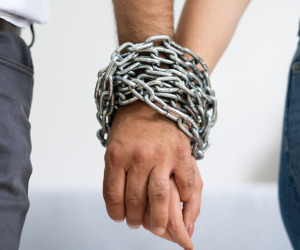How long will a rebound relationship last? ⏳
Rebound relationships, especially with a narcissist, are often short-lived. On average, a rebound relationship lasts about six months before collapsing under emotional strain. These connections are usually fueled by distraction, physical attraction, and emotional avoidance rather than genuine love. The reason they rarely last longer is that the foundation is weak, with both partners often using each other—whether as a replacement for an ex or for personal validation. Over time, the excitement fades, unresolved emotions resurface, and the relationship runs its course. While some rebounds survive beyond the six-month mark, most fizzle out once reality sets in and true compatibility is tested.
Understanding narcissists in relationships: Why rebounds fail
Narcissistic relationships are often tumultuous and short-lived, leaving their partners emotionally drained. Before we dive into the dynamics of rebound relationships with narcissists, it’s important to understand one key fact: narcissists are completely incapable of being in a healthy and stable relationship. Their inability to love explains why they jump from fling to fling and rebound to rebound. While they may crave control and attention, they lack the emotional depth required for genuine connection.
>>> Read:
Can a narcissist become obsessed with someone?
5 reasons why rebound narcissist relationships only last 6 months to a year
Rebound relationships with narcissists are doomed to fail for several reasons. Let’s explore the top five:
1) Narcissists become too controlling
Although narcissists rarely seek serious relationships, they can’t help but try to control every aspect of their partner’s life. They need to call the shots and micromanage everything to feel powerful. Unfortunately, rebound relationships are better suited to laid-back personalities who are just looking for a good time. Narcissists’ controlling tendencies often push their partners away.
2) Their insecurities double
Rebound relationships are typically casual and lack exclusivity, which can be unsettling for narcissists. Without a partner constantly stroking their ego, narcissists become hyper-focused on their flaws and insecurities. The lack of emotional security in a rebound relationship often leaves them feeling vulnerable and dissatisfied.
3) They become even more critical
Narcissists’ toxic traits are impossible to hide for long. Even in casual relationships, they criticize their partners relentlessly, often targeting their appearance or self-worth. This behavior quickly alienates their partners, leading to the inevitable collapse of the relationship.
4) They don’t want to invest themselves
Narcissists are not interested in love or emotional connection. They view relationships as opportunities to manipulate and exploit others for their own benefit. As a result, they avoid emotional investment and only engage in relationships when it suits their needs. Long-term commitment is never part of their plan.
5) They aren’t prepared to change
Let’s face it: narcissists never change. They may promise to improve, but they are fundamentally incapable of becoming better people. This makes it nearly impossible for their partners to develop genuine feelings for them. In relationships with narcissists, all the effort comes from their partner, leaving them feeling unappreciated and exhausted.
Do narcissists ever regret leaving their victims?
Narcissists have inflated egos and struggle to admit mistakes, making it unlikely that they feel genuine regret about leaving their partners. However, they may superficially regret losing the social status, material benefits, or convenience provided by the relationship. This regret is often tied to external factors rather than emotional attachment.
It’s important to remember that narcissists’ reactions vary. Some may use manipulative tactics to regain control over their former partners, while others may quickly move on to their next victim. Instead of focusing on their regrets, prioritize your own healing and self-care. Therapy and professional support can help you understand the dynamics of the relationship, heal from emotional pain, and rebuild your life in a healthy, balanced way.
How to heal after a relationship with a narcissist
Recovering from a relationship with a narcissist can be challenging, but it’s not impossible. Here are some tips to help you move forward:
- Seek professional help: Therapy can provide valuable tools and insights to help you process your emotions and rebuild your self-esteem.
- Set boundaries: If you need to maintain contact with your ex (e.g., for co-parenting), establish clear boundaries to protect your mental health.
- Focus on self-care: Prioritize activities that bring you joy and relaxation, such as exercise, meditation, or spending time with loved ones.
- Educate yourself: Learn about narcissistic behavior to better understand what you’ve experienced and prevent similar patterns in the future.
Remember, healing takes time, and it’s okay to seek support along the way. You deserve a healthy, fulfilling relationship built on mutual respect and love.
Editor’s note - Love is an alien concept for narcissistsWhile most people dream of falling in love and settling down, narcissists view this life plan as monotonous. They cannot truly love anyone but need a steady supply of victims to manipulate. Ultimately, they only feign interest in their partners to get what they want. 🤗 Understand yourself, accept yourself, be happy... Let’s do it here and now! #BornToBeMe Connect with an advisor |
For more insights into narcissistic behavior, check out these articles:



























My husband was stuck in love with his mistress and broke up our 3 years marriage. After taking help from Adu solution temple (solutiontemple.info) my husband suddenly realized his mistake and came back to my life. i really appreciate the effort made by the priest to reunite us back.
kate, 2 years ago